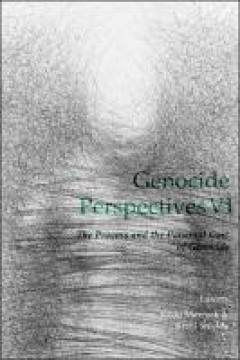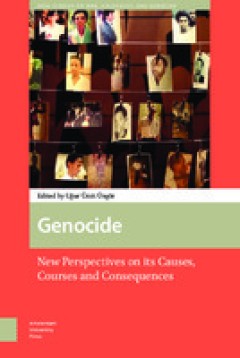Filter by

Genocide Perspectives VI
Genocide Perspectives VI grapples with two core themes: the personal toll of genocide, and processes that facilitate the crime. From political choices governments and leaders make, through to denialism and impunity, the crime of genocide recurs again and again, across the globe. At what cost to individuals and communities? What might the legacy of this criminality be? This collection of essays …
- Edition
- -
- ISBN/ISSN
- -
- Collation
- -
- Series Title
- -
- Call Number
- -

Genocide
The twentieth century has been called, not inaccurately, a century of genocide. And the beginning of the twenty-first century has seen little change, with genocidal violence in Darfur, Congo, Sri Lanka, and Syria. Why is genocide so widespread, and so difficult to stop, across societies that differ so much culturally, technologically, and politically? [-]That's the question that this collection…
- Edition
- -
- ISBN/ISSN
- 9789089645241
- Collation
- -
- Series Title
- -
- Call Number
- -

Human remains in society: curation and exhibition in the aftermath of genocid…
Whether reburied, concealed, stored, abandoned or publicly displayed, human remains raise a vast number of questions regarding social, legal and ethical uses by communities, public institutions and civil society organisations. This book presents a ground-breaking account of the treatment and commemoration of dead bodies resulting from incidents of genocide and mass violence. Through a range of …
- Edition
- -
- ISBN/ISSN
- 9781526129338
- Collation
- xiv, 254 pages : illustrations ; 22 cm.
- Series Title
- Human remains and violence
- Call Number
- 306.9 HUM a

Forbidden memories: women's experiences of 1965 in eastern Indonesia
This is the first book to consider the experiences of women survivors of the 1965 anti-communist violence in the majority Christian region of Eastern Indonesia. So far, most studies of the 1965 violence have focused on the Muslim majority population of Java and the Hindu majority population of Bali. Forbidden Memories presents stories from across the regions of Sumba, Sabu, Alor, Kupang and oth…
- Edition
- -
- ISBN/ISSN
- 9781925523843
- Collation
- xxiv, 353p.: ill.
- Series Title
- -
- Call Number
- 305.4 KOL f
 Computer Science, Information & General Works
Computer Science, Information & General Works  Philosophy & Psychology
Philosophy & Psychology  Religion
Religion  Social Sciences
Social Sciences  Language
Language  Pure Science
Pure Science  Applied Sciences
Applied Sciences  Art & Recreation
Art & Recreation  Literature
Literature  History & Geography
History & Geography